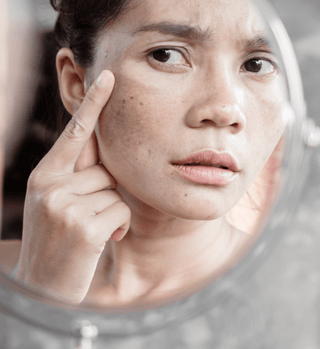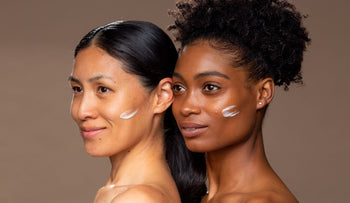Also known as sun spots or liver spots, hyperpigmentation causes freckles, dark spots or discoloration to the skin. You’ll often find hyperpigmentation on areas of the body that are frequently exposed to the sun, such as your hands and face.
Hyperpigmentation is generally harmless, but the unsightly appearance of skin discoloration may affect your self-esteem. If this is the case, it’s understandable that you’ll want to do something about it. Keep reading to find out more about hyperpigmentation and what you can do to prevent it and treat it.
WHAT CAUSES SKIN HYPERPIGMENTATION?
Hyperpigmentation occurs when your body produces too much melanin, the pigment that gives your skin its color. There are several different factors that can cause your body to over-produce melanin, many of which you can manage yourself. So, what are they and what can you do to prevent hyperpigmentation from occurring?
Sun exposure
One of the main causes of skin hyperpigmentation is sun exposure. Too much time spent in the sun, without adequate protection such as SPF, can speed up the body’s production of melanin, which ultimately leads to hyperpigmentation, and boosts signs of aging like deep wrinkles.
If you have light skin that’s prone to burning easily then you’re more at risk of this happening, but regardless of skin tone you should be protecting yourself from the sun with an SPF all year round.
MENOPAUSE
The menopause can bring about different changes for different people, but many women see a difference in their skin condition, particularly more pigmentation on their face as a result of a combination of hormonal changes and sun exposure.
HORMONE LEVELS
Your hormones impact your skin’s health, meaning that anything that influences your hormones, such as pregnancy or the use of birth control, can lead to hyperpigmentation.
A particular kind of hyperpigmentation known as melasma occurs as a direct result of changes in your hormone levels, particularly during pregnancy. It's more prevalent on your cheeks, nose, and chin, but it can affect any part of the skin that is exposed to sunlight, which is why it gets worse during the summer months.
Skin inflammation
From common skin conditions like acne to skin injury or trauma heals, anything that causes inflammation of the skin can put you at risk of hyperpigmentation. This is because as the skin heals, new cells replace the damaged ones, and these may contain more melanin than the original cells. Since melanin causes hyperpigmentation, dark spots will then begin to appear.
Types of hyperpigmentation
MELASMA
Also called ‘the mask pregnancy’ since it’s more common in pregnant women, melasma occurs when there is a change of hormones in the body. Symptoms of melasma include large patches of darkened skin, primarily on the face.
AGE SPOTS
Often seen on people over 40 years of age, age spots cause brown, tan, or black spots to appear on the skin with sun overexposure.
How is hyperpigmentation prevented?
The best treatment for hyperpigmentation is prevention. Here are some ways you can protect yourself from an uneven skin tone:
Apply SPF
For optimal protection on areas that can’t be covered such as the face and hands, an SPF of at least factor 30 should be worn all year round regardless of the weather.
Many daily moisturizers contain SPF, saving you the hassle of having to apply sunscreen separately.
Wear a hat and sunglasses
Wearing a hat shades certain areas of your face and neck from the sun’s rays, protecting your skin from UV damage. As well as shielding your eyes, sunglasses protect the sensitive skin around your eyes, preventing you from burning in this area.
Avoid direct sunlight
While sunlight is important for your vitamin D levels, it’s best avoided between the hours of 10 AM and 4 PM when the UV rays can be the most powerful.
Retinol for hyperpigmentation
If you have areas of hyperpigmentation on your body that you want to treat, then use a product containing retinol, such as our Line Smoothing Night Serum Capsules.
Retinol works to increase the rate of cell turnover, resulting in old, pigment-rich skin cells being replaced with fresh, new cells. You’ll also see a noticeable reduction in wrinkles and fine lines with continued use.
Lots of people deal with hyperpigmentation, but there are many things you can do to prevent and treat an uneven skin tone. Our Even Tone + Lift 5 In 1 Night Cream works to fight five signs of aging in just four weeks, leaving you with reduced discoloration. You may also notice reduced density loss, dryness, dull tone, and wrinkles.
For more tips and advice, head over to our blog or discover more on the topic of protecting your skin with SPF.







